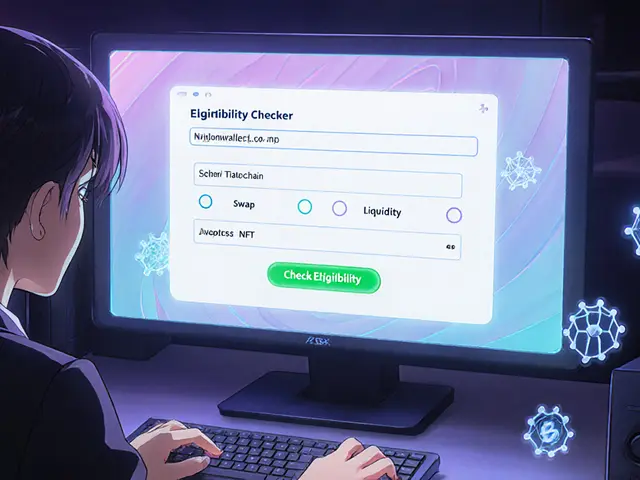Transaction Splitting Calculator
Calculate Your Account Split
Turkish licensed exchanges enforce a 15,000 TL monthly transaction limit per account. This calculator shows how many accounts you need to avoid triggering financial authorities' review.
They can't use crypto to pay for coffee, but they trade billions anyway
In April 2021, Turkey banned the use of cryptocurrency for payments. Banks and payment providers were told: no buying coffee with Bitcoin, no paying rent with Ethereum. But here’s the twist - holding crypto, trading it, and moving it between wallets? Still completely legal. The result? One of the most active crypto markets on the planet - built entirely around rules that were meant to stop it.
By 2024, Turkish citizens traded over $85 billion in crypto. That’s more than most European countries. And it’s not because they’re speculating on moonshots. It’s because the Turkish lira lost nearly 40% of its value against the dollar between 2021 and 2024. People aren’t chasing crypto because it’s trendy. They’re using it because it’s one of the few ways left to protect their savings.
How the ban actually works - and why it backfired
The Central Bank of Turkey didn’t ban crypto outright. They banned its use as a payment method. That means you can’t walk into a store and pay with Bitcoin. But you can still buy Bitcoin, sell it, trade it, and send it overseas. The goal? To stop people from bypassing currency controls and draining the country’s foreign reserves. It made sense on paper.
But people didn’t stop trading. They just got smarter.
Instead of using crypto to pay for goods, they turned it into a currency conversion tool. Buy Bitcoin on a Turkish exchange with Turkish lira. Send it to a foreign wallet. Sell it for USD or EUR on an international platform. Withdraw the dollars to a foreign bank account. Suddenly, you’ve moved money out of a collapsing currency - without triggering bank surveillance.
The ban didn’t stop crypto. It turned it into a lifeline.
The three main ways Turks trade crypto today
There’s no single way to trade crypto in Turkey anymore. There are three main paths - each with different risks, speeds, and rules.
- Licensed exchanges - Platforms like Paribu, Binance Turkey, and Bitlo are officially approved by the Capital Markets Board (CMB). You need ID verification, and you can’t move more than 15,000 Turkish lira (about $425) in a single transaction without extra checks. But they’re safe. If something goes wrong, you can file a complaint. They’re also the only ones that let you convert crypto directly to Turkish lira and withdraw to your bank account.
- Peer-to-peer (P2P) trading - This is where most of the action happens. People trade directly with each other using Telegram groups, WhatsApp, or platforms like LocalBitcoins. No ID needed. No limits. But you’re trusting a stranger. Premiums on these trades can be 0.5% to 2% higher than on licensed exchanges. In December 2024, Turkish users traded over $1.2 billion monthly on P2P platforms.
- Unregulated international platforms - You can’t access Coinbase or Kraken directly from Turkey - they’re blocked. But if you use a VPN, you can. About 68% of Turkish crypto users have used a VPN to reach these platforms, according to a 2024 TÜBİTAK study. Others use MetaMask to connect to decentralized exchanges like Uniswap, routing traffic through non-Turkish servers. This lets them trade tokens that aren’t even available on local exchanges.
Most people don’t stick to one method. A 2025 survey found that 78% of Turkish crypto users use at least two of these methods. Why? To avoid hitting the 15,000 TL limit on licensed exchanges. To get better prices. To access more coins. To stay anonymous.

The 15,000 TL limit - and how people beat it
The biggest pain point for Turkish traders isn’t the ban. It’s the 15,000 TL transaction cap.
Once you hit that limit in a month on a licensed exchange, you get flagged. Your account might be frozen. You’ll need to submit proof of income, tax documents, or even bank statements. Many users say it takes weeks to get access back.
So they split it.
One user told a forum: “I have three accounts - mine, my wife’s, my brother’s. Each one gets under 15k TL per month. We pool the crypto, then move it together.” This trick, called “transaction splitting,” is used by 68% of users who’ve shared their methods online. It’s not illegal - but it’s a workaround the regulators are trying to shut down.
In February 2025, the CMB cracked down on 46 unregulated platforms, including PancakeSwap and SushiSwap. But users didn’t stop. They just switched to decentralized wallets with custom RPC settings. A GitHub project called “TurkWallet” now automates splitting transactions across multiple wallets to stay under the radar. It has over 4,200 stars and 87 contributors.
Who’s trading - and why
It’s not just tech bros. Crypto adoption in Turkey is broad.
According to TÜİK’s 2024 survey, 45% of Turkish adults own some form of crypto. That’s 19.5 million people. Most are between 25 and 44. Many are small business owners, freelancers, or salaried workers watching their salaries lose value every month.
Stablecoins like USDT are the most traded asset - not Bitcoin. Why? Because they hold value. You can buy USDT with lira, hold it while the lira drops, then sell it for dollars when you need to. It’s not speculation. It’s survival.
Urban areas lead the way. In Istanbul, nearly half of adults have traded crypto. In rural towns, it’s closer to 18%. Access to internet, tech literacy, and exposure to global markets make the difference.

The risks - and what happens when things go wrong
Trading crypto in Turkey isn’t risk-free.
Over 22% of users reported having their accounts frozen by MASAK - Turkey’s financial crimes unit - for “suspicious activity.” That usually means moving too much money too fast, even if it’s all legal. Getting it unfrozen can take 14 to 30 days. Some users say they’ve lost months of access.
P2P scams are common. Someone sends you lira, you send them crypto - then they disappear. No chargebacks. No recourse. Telegram groups have become minefields.
And then there’s the legal gray zone. The government hasn’t made crypto illegal. But it has made it harder. In 2025, they added 17 more banned platforms. They’re pushing for a “Crypto Asset Gateway” by 2026 - a system that would force all crypto on-ramps through government-monitored channels. If that happens, the workarounds might disappear.
What the experts say - and what’s next
Dr. Ayşenur Acar, a financial regulation professor at Ankara University, put it bluntly: “The payment ban created a paradox. Turkey has one of the world’s most active crypto markets - but the government won’t let people use it for what it’s best at: moving value.”
The World Bank estimates that the shadow crypto economy in Turkey - VPNs, P2P platforms, wallet tools - is now a $3.2 billion industry, employing over 15,000 people. It’s not just users. It’s developers, coders, customer support agents, and even crypto tutors.
Meanwhile, international exchanges are adapting. Kraken partnered with AKBank in April 2025 to let users buy crypto with lira - legally, within the rules. Binance Turkey now processes over $1.8 billion monthly. The regulated market is growing - but it’s still only serving 35% of users.
Most analysts agree: as long as the lira keeps losing value, and as long as trading crypto remains legal, people will find a way. The ban didn’t kill crypto. It forced it underground - and made it more resilient.
The next big move? A new CMB rule in 2026 that could centralize all crypto transactions. But if history is any guide, the market will adapt faster than the regulators can keep up.
Frequently Asked Questions
Is it legal to trade crypto in Turkey?
Yes, buying, selling, and holding cryptocurrency is completely legal in Turkey. The only restriction is using it to pay for goods or services - which was banned in April 2021. Trading on exchanges, P2P platforms, or decentralized wallets is not against the law.
Can I use Binance or Coinbase in Turkey?
Binance Turkey is a locally licensed exchange and fully operational. International platforms like Coinbase and Kraken are blocked by Turkish ISPs. But you can access them using a VPN. Many users do this to trade tokens not available on local exchanges.
What’s the 15,000 TL limit, and why does it matter?
Licensed exchanges in Turkey must enforce a 15,000 Turkish lira (about $425) monthly transaction limit per user. If you exceed it, your account may be flagged for review by financial authorities. Many users split transactions across multiple accounts or family members to avoid this limit.
How do Turks avoid being tracked when trading crypto?
Common methods include using VPNs to access foreign exchanges, trading via Telegram-based P2P groups, using decentralized wallets like MetaMask with non-Turkish RPC nodes, and splitting transactions across multiple wallets. Some use open-source tools like TurkWallet to automate these processes.
Are stablecoins popular in Turkey?
Yes. Over 38% of all crypto transactions in Turkey involve stablecoins like USDT. People use them to protect savings from lira depreciation. You buy USDT with lira, hold it while the currency drops, then convert it back to dollars when needed - effectively acting as a digital dollar.
What happens if my crypto account gets frozen?
If MASAK (Turkey’s financial crimes unit) flags your account for “suspicious activity,” you may lose access for 14 to 30 days. You’ll need to submit documentation like bank statements or proof of income. Many users report delays and frustration. Using P2P or unregulated methods avoids this risk but increases exposure to scams.
Is crypto trading in Turkey likely to become illegal?
No. The government has no plans to ban crypto ownership or trading. The focus is on controlling payment use and increasing oversight. Future regulations may centralize all on-ramps through licensed gateways, but trading itself will likely remain legal - even if harder to do anonymously.







Comments
Edward Phuakwatana
November 11, 2025 AT 12:50 PMThis is wild. Turkey didn't ban crypto-they just made it *more* useful. People aren't gambling; they're surviving. USDT isn't a coin, it's a time machine for your savings. 🚀💸
Suhail Kashmiri
November 11, 2025 AT 18:07 PMLira's garbage, so they use crypto? Wow. So much for national sovereignty. I mean, if your currency's collapsing, maybe fix your economy instead of turning into a crypto cowboy.
Kristin LeGard
November 12, 2025 AT 15:38 PMOMG. This is why America needs to stop being soft. If we let people do this, the dollar would be DEAD. They're literally weaponizing blockchain to escape their own government's failures. Pathetic. 🤦♀️
Arthur Coddington
November 14, 2025 AT 05:58 AMI mean... it's just capitalism being capitalism, right? People will always find a way. The real tragedy isn't the ban-it's that we still think governments can control money. We're all just ants under a magnifying glass.
Phil Bradley
November 15, 2025 AT 02:54 AMHonestly? This is beautiful. The ban backfired so hard it became a revolution. People aren't just trading-they're building a new financial skeleton under the old one. It's like watching a phoenix rise from a spreadsheet. 🌅
Stephanie Platis
November 16, 2025 AT 02:51 AMI'm not sure how anyone can justify circumventing currency controls-especially when it's done via multiple accounts, VPNs, and unregulated platforms. This isn't innovation; it's systemic evasion. And it's dangerous.
Michelle Elizabeth
November 16, 2025 AT 22:35 PMIt's funny. People call it 'crypto' like it's some magical tech. But really? It's just digital dollars. And Turks? They're just doing what humans have always done-find the loophole. The real story isn't blockchain. It's desperation.
Joy Whitenburg
November 17, 2025 AT 09:59 AMso like... imagine your salary drops 40% in 3 years. what would YOU do? i'd use crypto too. the system's broken, not the people. also, i love how they just... made their own system. 💪✨
Kylie Stavinoha
November 19, 2025 AT 05:41 AMThis phenomenon reflects a deeper truth: when institutional trust collapses, decentralized alternatives emerge organically. The Turkish case is not an anomaly-it is a prototype for post-sovereign finance. The state’s attempt to regulate value transfer only accelerated its decentralization. A fascinating sociotechnical evolution.
Diana Dodu
November 20, 2025 AT 07:19 AMWait-so they’re using crypto to bypass their own government? That’s treason. If they hate their currency so much, why don’t they just leave? This isn’t freedom-it’s cowardice. And now they’re teaching others to do it? No. Just no.
Raymond Day
November 22, 2025 AT 04:42 AMTHEY’RE USING VPNs TO BUY BITCOIN??!! 😱 This is the end of financial sovereignty. Next thing you know, kids in Ohio will be using MetaMask to pay for pizza while the Fed screams into the void. The system is crumbling. We’re all just watching it happen. #CryptoApocalypse
Noriko Yashiro
November 24, 2025 AT 00:21 AMThis is actually kind of inspiring. People creating their own rules when the system fails them. Not rebellious-resourceful. The real innovation here isn't blockchain-it's human ingenuity. Keep going, Turkey. 💫
Atheeth Akash
November 25, 2025 AT 01:28 AMinteresting how the ban made crypto more useful. people are not chasing hype. they are chasing survival. simple. smart. no drama. just doing what needs to be done
James Ragin
November 26, 2025 AT 11:33 AMLet me guess-this is all part of a globalist plan to dismantle national currencies. The Central Bank didn’t ban crypto to protect reserves. They were ordered to. The same people who pushed for the 15,000 TL limit are the same ones who want to replace the dollar with a CBDC. This isn’t about economics. It’s about control.
Michael Brooks
November 27, 2025 AT 05:23 AMThe 15,000 TL limit is the real villain here. It’s not the ban-it’s the arbitrary cap that forces people into messy workarounds. Imagine if your bank said you could only transfer $425/month. You’d split it too. This isn’t crypto magic. It’s basic human behavior under bad rules.
David Billesbach
November 28, 2025 AT 10:15 AMYou think this is clever? Wait until the government mandates that every wallet must be registered with a national ID. They’re already building the Crypto Asset Gateway. This isn’t a rebellion-it’s a countdown. They’ll track your MetaMask. They’ll trace your Telegram P2P. They’ll know who you sent USDT to. And then? You’ll be on a list. Don’t be fooled. This is a trap.
Whitney Fleras
November 29, 2025 AT 01:33 AMI just want to say-this is the most human thing I’ve read all year. People aren’t trying to be hackers. They’re trying to eat. They’re trying to send money to family. They’re trying not to lose everything. The real crypto revolution isn’t in the code. It’s in the courage.
Michael Brooks
November 30, 2025 AT 13:37 PMYou know what’s wild? The TurkWallet GitHub project. 4,200 stars. That’s not a hack. That’s a community building a safety net. People coding for their neighbors. No VC funding. No whitepapers. Just code to keep families from starving. That’s the real DeFi.